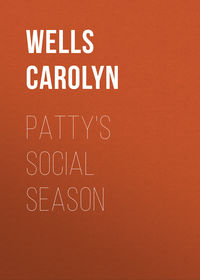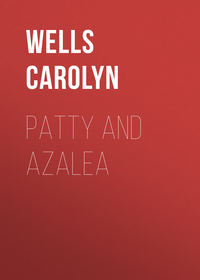
Patty's Friends
Half bewildered, Patty dropped the book, jumped up, and went to the door of the hall. No one was there, and the girl was glad of it, for if she really was on the eve of a great discovery she wanted to be alone at first.
As she entered the room, the lines came to her mind:
“Above the stair, across the hall,Between the bedhead and the wall,”and she noticed that the chimney-piece stood on a sort of wide platform, which extended across that whole end of the hall. Could it be that Mr. Marmaduke had meant above this platform, calling it a stair, which ran across the great hall? For years they had taken the direction to mean “up the staircase,” and “across the corridor,” or hall which led to the bedrooms.
Slowly, almost as if afraid, Patty crossed the hall, stepped up on the platform, and examined the old chimney-piece. She couldn’t tell, positively, but surely, surely it looked as if it might once have been the headboard of an ancient bed. It certainly was different in its workmanship from the wood carving that decorated the apartment.
The top of it was well above her head, but might it not be that the old rhyme meant between this bedhead and the wall?
Here they had never looked. It must be that it was not generally known that this mantel was, or had been, a bedhead.
Still, as if in a daze, Patty went and sat in a chair facing the old chimney-piece, and wondered. She intended to call the others in a moment, but first she wanted to enjoy alone the marvel of her own discovery.
As she sat there, scrutinising every detail of the room, the lines kept repeating themselves in her brain:
“Above the stair, across the hall, Between the bedhead and the wall.”
If the secret pocket was between that bedhead and the wall, it was certainly above the stair across the hall! Why had that stair or platform been built across the hall? It was a peculiar arrangement.
This question Patty gave up, but she thought it might well have been done when the bedhead was set up there, in order to make the chimney-piece higher and so more effective.
Patty had learned something of architecture in her library browsings.
Above the high mantel was a large painting. It was a landscape and showed a beautiful bit of scenery without buildings or people. In the foreground were several distinct trees of noble proportions.
“They’re firs,” said Patty to herself, for she had become thoroughly familiar with fir trees.
And then, like a flash, through her brain came the words:
“Great treasure lieth in the poke Between the fir trees and the oak.”
The secret was revealed! Patty knew it!
Beside the bedhead evidence, it was clear to her mind that “Between the fir trees and the oak,” meant between these painted fir trees and the old carved oak mantel. Grasping the arms of her chair, she sat still a minute trying to take it all in, and then looked about for something to stand on that she might examine the top of the old mantel-shelf.
But her next quick thought was, that that was not her right. Those to whom the fortune belonged must make the investigation themselves.
“Sinclair,” called Patty, again; “Mabel, Mrs. Hartley, where are you all?”
Bob responded first, and seeing by Patty’s excited face that she had discovered something important, he went in search of the others.
At last they were all gathered in the great hall, and Patty’s sense of the dramatic proved too strong to allow her to make her announcement simply.
“People,” she said, “I have made a discovery. That is, I think I have. If I am right, the Cromarty fortune is within your grasp. If I am wrong—well, in that case, we’ll begin all over again.”
“Tell us about your new find,” said Sinclair, selecting a comfortable chair, and sitting down as if for a long session. “Is it another mason’s bill?”
Nobody minded being chaffed about searching or finding, for the subject was treated jocosely as well as seriously.
Patty stood on the platform in front of the carved oak chimney-piece, and addressed her audience, who listened, half laughing, half eager.
“What is this on which I stand?” she demanded.
“A rug,” replied Mabel, promptly.
“I mean beneath the rug?”
“The floor.”
“No, it isn’t! What is this—this construction across the room?”
“A platform,” put in Bob, willing to help her along.
“Yes. But what else could it be called? I’m in earnest.”
“A step,” suggested Sinclair.
“Yes, a step; but couldn’t it be called a stair?”
“It could be,” said Bob, “but I don’t believe it is one.”
“But suppose your erratic uncle chose to call it that.”
“Oh,” laughed Bob, “you mean the stair in the poem.”
“I do. I mean the stair across the hall.”
“What! Oh, I say, Patty, now you’re jumbling up the sense.”
“No, I’m not. I’m straightening out the sense. Suppose Mr. Marmaduke meant ‘above the stair across the hall,’ and meant this stair and this hall.”
“Yes, but go on,” said Sinclair; “next comes the bedhead.”
“That’s my discovery!” announced Patty, with what was truly forgivable triumph.
“This carved oak chimney-piece is, I have reason to believe, the headboard of some magnificent, ancient bed.”
“Patty Fairfield!” cried Sinclair, jumping up, and reaching her side with two bounds. “You’ve struck it! What a girl you are!”
“Wait a minute,” said Patty, pushing him back; “I’m entitled to a hearing. Take your seat again, sir, until I unfold the rest of the tale.”
Patty was fairly quivering with excitement. Her cheeks glowed, and her eyes shone, and her voice trembled as she went on.
Mabel, with clasped hands, just sat and looked at her. The elder ladies were plainly bewildered, and Bob was trying hard to sit still.
“I read in an old book,” Patty went on, “how somebody else used a carved headboard for a chimney-piece, and I wondered if this mightn’t be one. And it surely looks like it. And then I wondered if ‘above the stair across the hall’ mightn’t mean this platform across this hall. And I think it does. But that’s not all. My really important discovery is this.”
Patty’s voice had sunk to a thrilling whisper, and she addressed herself to Mrs. Cromarty, as she continued.
“I think the other rhyme, the one that says the fortune is concealed ‘between the fir trees and the oak,’ refers to this same place, and means between the painting of fir trees, which hangs over the mantel, and—the oak mantel itself!”
With a smiling bow, Patty stepped down from the platform, and taking a seat by old Mrs. Cromarty, nestled in that lady’s loving arms. The two boys made a spring for the mantel, but paused simultaneously to grasp both Patty’s hands in theirs and nearly shake her arms off. Then they left the heroine of the hour to Mabel and Mrs. Hartley and began to investigate the chimney piece.
“‘Between the fir trees and the oak’!” exclaimed Bob. “Great, isn’t it! And here for thirty-five years we Cromarty dubs have thought that meant real trees! To think it took a Yankee to tell us! Oh, Patty, Patty, we’ll take down that historic painting and put up a tablet to the honour of Saint Patricia. For you surely deserve canonisation!”
“‘Between the bedhead and the wall,’” ruminated Sinclair. “Well, here goes for finding an opening.”
Clambering up on stools, both boys examined the place where the mantel shelf touched the wall. The ornate carvings of the mantel left many interstices where coins or notes might be dropped through, yet they were by no means conspicuous enough to attract the attention of any one not looking for them.
“Crickets!” cried Bob. “There’s a jolly place for the precious poke to be located. I’m going down cellar to see if I can find traces of that mason’s work. Come on, Clair.”
The two boys flew off, and the ladies remained discussing the wonderful discovery, and examining the old chimney-piece.
“I can see it was a bedhead now,” said Mabel; “but I never suspected it before. What a splendid mantel it makes. Didn’t you ever hear its history, Grandy?”
“No, dear. It must have been put there when the house was built, I think. Though, of course, it may have been added later. But it was all before my time. I married your grandfather Cromarty and came here to live in 1855. The building and decorations then were all just as they are now, except for such additions as Marmaduke made. He may have had that mantel set up in earlier years—I don’t know. He was very fond of antique carvings.”
Back came the boys from the cellar.
“The whole chimney is bricked up,” Sinclair explained. “We couldn’t get into it without tearing it all down. And do you know what I think, Grandy? I think it would be wiser to take away the chimney-piece up here, and do our investigating from this end. Then, if we find anything, it will all be in this room, and not in the cellar, where the servants can pry about.”
“I quite agree with you,” said Mrs. Cromarty, “and I put the whole matter in your hands. You and Robert are the sons of the house, and it is your right to manage its affairs.”
“Then I say, tear it down at once,” cried Bob. “We needn’t damage the carving itself, and all that we break away of plaster or inner woodwork can easily be repaired, whatever our success may be.”
“Shall we begin now?” asked Sinclair, doubtfully. He was not so impetuous as Bob, and would have been quite willing to study over the matter first.
“Yes, indeed!” cried his impatient brother. “I’m not going to waste a minute. I’m glad I’m a bit of a carpenter. Though not an expert, I can tear down if I can’t build up.”
“But we must take it down carefully,” said Sinclair. “These screws must come out first.” But Bob had already gone for tools, and soon returned with screw-drivers, chisels, gimlets, and all the paraphernalia of a carpenter’s well-appointed tool-chest.
“Here goes!” he cried, as he put the big screw-driver in the first screw. “Good luck to the Cromartys and three cheers for Uncle Marmaduke and Patty Fairfield!”
CHAPTER XIX
THE DISCOVERY
The removal of the old chimney-piece was not an easy task. If the Hartley boys hadn’t been big and strongly-built, they could scarcely have succeeded in tearing away the woodwork from the wall. But they did do it, and their labours were rewarded by the discovery of the long-lost fortune!
Sure enough the historic “poke” was a pocket or recess between the old bedhead and the main wall. It was really built in the chimney itself, though not in the flue. But this chimney-place, with its wonderfully carved mantel, was never used for fires, and the fortune had remained undisturbed in its hiding-place.
As the boys lifted away the portion of the heavy oak that covered the secret pocket, a rough wall of plaster was seen, and by tapping on it, Sinclair learned that it was hollow.
“Shall we break through?” he said. “I feel sure the money is there.”
“Break through, of course,” cried Bob; “but wait a moment till I lock the doors. This is no time for intruders.”
Bob fastened the doors, and then with a hatchet they broke through the plaster.
And even as the old mortar crumbled beneath their blows, out fell a shower of glittering gold coins and tightly folded banknotes!
The sight was too much for the strained nerves of the watchers. Mabel burst into tears, and Mrs. Cromarty trembled like a leaf.
The boys broke into shouts of joy, and Patty scarcely knew whether to laugh or cry. But in a moment they were all congratulating each other and showering praises on Patty for her cleverness in the matter.
“It’s ours! It’s ours!” cried Bob. “It’s Grandy’s, to be sure, but it belongs to old Cromarty Manor, and we’re all Cromartys. Patty, you’re hereby adopted and made one of us.”
“What shall we do with it?” asked the more practical Sinclair. “I mean, just at present. We must take care of it, at once, you know. We can’t leave it long like this.”
“There’s the old Spanish chest,” said Mrs. Hartley, indicating a good-sized affair that stood nearby. “Put it in that.”
“Just the thing,” said Bob. “Lend a hand, Clair.”
It was a strange proceeding. The old coins, many of them still bright, though of far back dates; represented a great deal of money. How much, they could not guess as yet, but it was surely a large sum. Also there were Bank of England notes, folded small that they might be pushed through the openings in the carved oak, and well-preserved, as the pocket had been carefully made damp-proof.
The boys took the money out in double handfuls and deposited it in the old Spanish chest.
“It will be quite safe there until to-morrow,” said Mrs. Hartley, “and then we must get it to the bank. But as no one yet knows of our discovery, there can be no danger of its being stolen to-night.”
“What ever made Uncle Marmaduke choose this way of concealing his fortune?” asked Bob, as he kept on transferring the money from its hiding-place to the chest.
“He had a fear of banks or investments,” said Mrs. Cromarty. “I’ve often heard him say he wouldn’t trust any of them. He said he’d rather be sure of his principal, and go without his interest.”
“Crickets!” said Bob, “if all this had been out at interest for forty years, think how it would have increased!”
“Yes,” said his mother, “but in that case it would not have been hidden, and before now, it might have all been spent.”
“Then I’m glad the old gentleman chose this way of banking. And I suppose he meant to leave full instructions where to find it.”
“Well,” said Sinclair, “we found it without his instructions, thanks to our Patty.”
And then they all began again to bless and praise Patty, until she was really embarrassed at their overwhelming gratitude.
“We’d offer you a share,” said Bob, gaily, “but you already have more than you know what to do with.”
“Perhaps not quite that,” said Patty, smiling, “but I have enough. And, oh! I am so glad that you have your own at last.”
“How much do you suppose there is?” asked Mabel, awestruck, as she watched the boys still carrying their precious handfuls across the room.
“Enough to buy you some new frocks, sister,” said Sinclair, “and enough to fix up dear old Cromarty as it should be fixed up.”
“There must be thousands of pounds,” said Grandma Cromarty. “To think of Marmaduke exchanging all his securities and bonds for gold and notes! I suppose he did it while I was away in London. He was a most erratic man.”
“Well, you see,” said Sinclair, thoughtfully, “once he had the place built, he could drop his money through whenever he received any. I can imagine the old chap, after every one else in the house was in bed, standing here and dropping in his coins one by one, and listening to them clink. Why, it’s like a child’s toy savings-bank, on a large scale.”
“It’s a large scale!” said Bob. “Whew! I’m tired out. But it’s nearly all in the chest now, and see, Grandy, the chest is nearly full! When shall we count it? And how shall we get this mess cleared away? If the servants come in here, they’ll know it all, at once. And I think we ought to keep the matter quiet until we can cart the gold away to the bank.”
“I think so too,” said his mother. “Suppose we leave this room exactly as it is, and lock it all up until to-morrow. Then we can talk it over this evening, and decide what is best to do. I think we should consult with Lawyer Ashton, and let him advise us.”
So, after carefully securing the windows, and locking all the doors of the room, it was a merry-hearted family who went away to dress for dinner.
“Let’s put on our prettiest frocks, and make the dinner a sort of celebration feast,” said Patty, who dearly loved an “occasion.”
“We will,” said Mabel, “and Grandy must wear her black velvet.”
Mrs. Cromarty was easily persuaded, and the happy old lady looked almost regal as, in her trailing gown, she led the way to the dining-room. The dinner conversation was on the all-absorbing topic, and Patty realised afresh how dearly these people loved their old home, and how anxious they were to devote their newly-found fortune to restoring the glories of the place.
“And now we can have the garden party!” exclaimed Mabel. “You know, Patty, we’ve had one every summer for years and years, and this summer we thought we couldn’t afford it. What fun to have you here to it!”
“Let’s have it soon,” said Sinclair. “Can you get ready in a week, mother?”
“Give me a little longer than that, son. And we want to send out the invitations about ten days before the party.”
“We’ll make the lists to-night. Let’s invite everybody. I suppose, after we put the money safely away, there’s no necessity for secrecy about it.”
“No, I think not. All our friends will rejoice with us, that we’ve found it at last.”
Later on, they all sat round the library table, and made plans for the garden party. Patty discovered that it would be a much larger and more important affair than she had imagined. The invitation list soon rose to about four hundred, and seemed literally to include everybody in all the country round.
“I really ought to have a new frock for the party,” said Mabel; “but we’ve so much going on that I won’t have time to get one made.”
This gave Patty an idea, and she determined to give Mabel a little surprise. While they were making the plans for the fête, she was planning to write to Lady Hamilton and ask her to send down from London two new frocks for herself and Mabel to wear at the garden party. She felt sure she could secretly procure one of Mabel’s old dresses to send for a pattern, and she meant that Mabel should not know of it until the new frock arrived.
The evening was a merry one, indeed. The boys were so exuberant that they laughed and sang snatches of songs, and exclaimed over and over how much they appreciated the good turn Patty had done them.
The two elder ladies were more quietly glad, and it did Patty’s heart good to see that the sad, anxious expression was gone from Mabel’s face.
The days before the garden party flew by quickly, for there was much to be done. Extra servants had to be secured, some repairing done in house and gardens, and the caterer’s orders attended to. The day before the party the dresses arrived from London. Lady Hamilton had chosen them, though Patty had given her a general idea of what she wanted.
Though they were called white muslin frocks, they were made almost entirely of fine embroidery and lace. Mabel’s was worn over a pink silk slip, and Patty’s over blue. Frenchy knots of ribbon were placed here and there, and when the boxes were opened and the tissue papers torn away, Mabel gave a shriek of delight at the beautiful things.
Patty had wanted to give Mabel a pretty frock, but had hesitated to do so, lest she wound her pride.
But this seemed different, and Patty offered the gift so prettily, as a souvenir of the garden party, that Mabel accepted it in the spirit it was given.
The day of the party was perfect. Just the right temperature, and not a cloud in the blue sky, except some fleecy little white ones that were as innocent as kittens.
The party was from three till six, and promptly at three o’clock the guests began to arrive. There was a continuous stream of carriages and motor cars, and soon Patty was almost bewildered by the crowds of people. Although introduced to them as they arrived, she couldn’t remember them all. But many of them she had met before, and after a time she and Mabel were excused from the receiving party, and were sent to mingle with the guests.
The old place was looking its best. Though there had not been time for much work on the gardens, yet a deal of tidying up had been done. New flowers had been set out in the formal flower beds, the fountains had been repaired and put in working order, and the shrubs and hedges had been trimmed. Patty, looking very sweet in her lovely white dress, wandered around indoors and out, greeting old friends and making new ones.
The house was thrown open, and of course the old chimney-piece, which had been replaced, was scrutinised with great interest. Patty was lionised until she became almost embarrassed at being made so prominent. But everybody was thoroughly glad that the Cromartys had come into their fortune at last. On the lawn was a band of musicians in gay scarlet and gold uniforms, who played popular music at intervals during the afternoon. The terraces and gardens were filled with groups of people pleasantly chatting, and the ladies’ pretty summer costumes added to the brilliancy of the scene.
At four o’clock tea was served in a great round tent, which had been put up for the purpose. Although called tea, the repast was a substantial supper of various and elaborate viands. Patty thought she had never seen so many sorts of salads and carefully constructed cold dishes. She sat at a small table with the Merediths and some other young people.
“You’re going to stay here all summer, aren’t you?” asked Tom, who sincerely hoped she was.
“I don’t know,” replied Patty. “I’d love to stay, for I’m happy every minute here. But my own people are writing me very urgently to join them in Switzerland. They’re in such delightful quarters there, that they think I’d like it too.”
“Oh, don’t go. Stay here with us. We’re going to get up a croquet club, and we want you to be a member.”
“I’ll be glad to, if I stay. But where are the people going now?”
The guests had all risen, and were being led to a part of the grounds where a platform had been erected. On this were a troupe of entertainers called The Pierrots. They all wore funny white suits, with little black pompons bobbing all over them. They sang amusing songs, played on cymbals and other instruments, did some clever acrobatic work, and for a half-hour entertained the guests who stood about on the grass, or sat on camp chairs to watch them.
At six o’clock the guests all took leave, and the great procession of vehicles again appeared on the driveway. Mrs. Cromarty and Mrs. Hartley received their good-byes, and Patty and Mabel invited a number of the young people to remain to dine and spend the evening.
“Though I’m sure we can’t eat any dinner, after that very satisfying tea,” said Grace Meredith, as she accepted the invitation.
In the evening they all went out on the lake for a moonlight row. Several new boats had been bought, and the young men rowed the girls about. The boats were hung with Chinese lanterns, which gave the lake the appearance of a regatta or a water festival.
Then back to the house for a dance in the great hall. The musicians had remained, and to their inspiriting strains the young people glided about in merry measures.
“Do give me another waltz,” Tom Meredith begged of Patty.
“I’d be glad to, Tom,” said Patty, frankly; “but I can’t do it without offending somebody else. I love to dance with you, but you’ve had three already, and I’ve promised all the rest.”
But Tom wheedled Mrs. Hartley into allowing one more extra, after the last dance, and he claimed Patty for that.
“You’re the best dancer I ever saw,” said Tom, as they floated away.
“You’re the best English dancer I ever saw,” laughed Patty, for she well knew English people do not dance like Americans. Good-natured Tom didn’t mind her implication, and after the waltz was ended he led her out on the terrace to sit down for a bit and rest. There were several others there, the Hartley boys among them, and soon they began to sing songs.
Others came and joined them, and the young voices rose in merry choruses and glees.
“You have splendid songs in England,” said Patty, after the men’s voices had come out strong in “Hearts of Oak” and “Rule Britannia.”
“Yes, we have,” agreed Tom. “But, Patty, won’t you sing something alone?”
“Do,” chorused the rest, and Mabel said: “Sing that newest song that you and Sinclair made.”
“‘The Moon’s Song?’” asked Patty.
“Yes; this is just the night for it.”
The moon was nearing the western horizon, and its soft light fell across the lake in silver ripples. Truly it was just the time and place to sing the pretty song of which Patty had composed the words, and Sinclair had set them to music. It was a simple air, but full of soft, lingering cadences, and without accompaniment Patty’s really sweet voice sounded exquisite as it thrilled through the summer evening air.
The song was called “The Minstrel Moon,” and the words were these:









